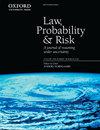An epistemic theory of the criminal process, Part II: Packer, Posner and epistemic pressure
IF 1.4
4区 社会学
Q1 LAW
引用次数: 0
Abstract
This is Part II of a novel ‘epistemic’ theory of the criminal process. Part I, a formal treatment of how poor measurements degrade control over systems of classification, was published in the last issue. This distinguished four distinct realms of control a policymaker may inhabit and established that the criminal process in the USA is trapped in the third best of these, routinely unable to establish that any policy is better than any other. Here, I first use the new epistemic concepts to mathematize Packer’s influential ‘two models’ theory, both a validation of the formal work and a way of giving it traction in the real world. I then use the new techniques to critique Posner’s law and economics and reject it on methodological grounds. I then argue that the activity of making policy for the criminal process, including any quantativity, is largely a form of ritual. The function of this has been to keep at bay an enduring pressure for rationality, as in Weber’s rationalization thesis, that could not be satisfied. Now that we have the capacity for better measurements, a rational approach is for the first time attainable, and I contemplate the end of the old order.刑事过程的认识论,第二部分:帕克、波斯纳与认识论压力
这是一个新颖的“认识论”犯罪过程理论的第二部分。第一部分,关于糟糕的测量如何降低对分类系统的控制的正式处理,发表在上一期中。这区分了决策者可能居住的四个不同的控制领域,并确定了美国的刑事程序被困在其中的第三好领域,通常无法确定任何政策都比任何其他政策更好。在这里,我首先使用新的认识论概念来数学化帕克有影响力的“两个模型”理论,这既是对形式工作的验证,也是在现实世界中赋予它吸引力的一种方式。然后,我使用新的技术来批评波斯纳的法律和经济学,并以方法论的理由拒绝它。然后,我认为,为刑事诉讼制定政策的活动,包括任何数量,在很大程度上都是一种仪式。这样做的作用是阻止对理性的持久压力,就像韦伯的理性化理论一样,这种压力是无法满足的。既然我们有能力进行更好的测量,一种合理的方法是第一次可以实现的,我考虑结束旧秩序。
本文章由计算机程序翻译,如有差异,请以英文原文为准。
求助全文
约1分钟内获得全文
求助全文
来源期刊

Law Probability & Risk
MATHEMATICSSTATISTICS & PROBABILITY&-STATISTICS & PROBABILITY
CiteScore
2.10
自引率
28.60%
发文量
8
期刊介绍:
Law, Probability & Risk is a fully refereed journal which publishes papers dealing with topics on the interface of law and probabilistic reasoning. These are interpreted broadly to include aspects relevant to the interpretation of scientific evidence, the assessment of uncertainty and the assessment of risk. The readership includes academic lawyers, mathematicians, statisticians and social scientists with interests in quantitative reasoning.
The primary objective of the journal is to cover issues in law, which have a scientific element, with an emphasis on statistical and probabilistic issues and the assessment of risk.
Examples of topics which may be covered include communications law, computers and the law, environmental law, law and medicine, regulatory law for science and technology, identification problems (such as DNA but including other materials), sampling issues (drugs, computer pornography, fraud), offender profiling, credit scoring, risk assessment, the role of statistics and probability in drafting legislation, the assessment of competing theories of evidence (possibly with a view to forming an optimal combination of them). In addition, a whole new area is emerging in the application of computers to medicine and other safety-critical areas. New legislation is required to define the responsibility of computer experts who develop software for tackling these safety-critical problems.
 求助内容:
求助内容: 应助结果提醒方式:
应助结果提醒方式:


